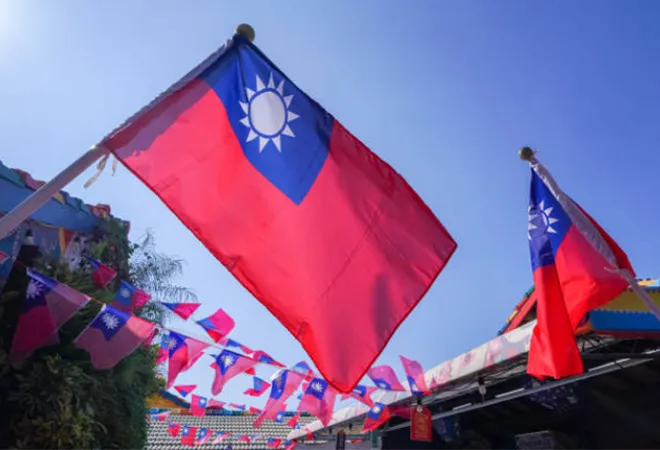
A lot has changed since the November 2022 local
9-in-1 elections in Taiwan. The term “9-in-1” is used
because 22 cities and counties come together to vote for nine different local government posts, which include city mayors and others. As the date—
13 January 2024—of the 2024 presidential elections approaches, experts on Taiwan’s politics are on the lookout for how the public of Taiwan votes in the much-anticipated three-way race.
Two of the three candidates in the race belong to the traditional two parties—
Hou You-yi for Kuomintang (KMT) and
Lai Ching-te for the Democratic Progressive Party (DPP). The newly formed in 2019 third alternative party, the Taiwan People’s Party (TPP) has
Ko Wen-je as their candidate. Being a new entrant, many are sceptical about TPP being able to provide a unique perspective to the voters in the upcoming election. The exciting part of this three-way race is that all the candidates are either current or former mayors.
Being a new entrant, many are sceptical about TPP being able to provide a unique perspective to the voters in the upcoming election.
Though there are major issues in Taiwan, varying from stagnant wages and high housing prices to pension policies and the economy, to name a few, this piece will primarily examine each candidate’s policy outlook, primarily on cross-strait relations and what it means for Taiwan’s domestic affairs.
KMT: Hou You-yi (Current New Taipei City Mayor, 2018-present)
Hou’s declaration as the presidential candidate for KMT at the party’s caucus on 23 July 2023 was nothing but a challenge. His competitor to the nomination, founder of Foxconn
, Terry Gou, is a part of the
Taishang (the Taiwanese business community in China) and had earlier claimed that China would not attack Taiwan
if he became the President as he would not declare independence.
Being the Mayor of Taiwan’s largest city since 2018, Hou is seen as one who has stirred controversies. At a time when KMT leaders are being blamed for being close to China, Hou’s cross-strait policy has stayed in line with the larger public view, i.e., to
maintain the status quo by rejecting independence. During his nomination race, Hou
stated, “Taiwanese independence has no legal basis, so I oppose it”. He added, “The Republic of China (ROC) is our country, and Taiwan is our home. We have to take good care of our home as well as our country”. Hou’s policy follows former president
Ma Ying-jeou’s ideas on the cross-strait, who maintained that ROC is the only China and his home.
Another of Hou’s policies that has raised the eyebrows of security analysts is bringing back the
four-month-old military conscription, should he be elected. Hou cited that the increased cross-strait tensions under the DPP led to an increase in conscription to
one year, and that he wants to bring back normalcy to the region, which will enable him to reduce conscription to four months.
At a time when KMT leaders are being blamed for being close to China, Hou’s cross-strait policy has stayed in line with the larger public view, i.e., to maintain the status quo by rejecting independence.
This move can be seen as an attempt by the Hou-KMT camp to bring back the young voters who will be affected by conscription, and for KMT to be seen as a party with policies favouring friendlier ties with China. If Hou gets elected as the next President, such a decision will seriously hamper the preparedness of Taiwan's defence, which is already facing a severe workforce shortage.
DPP: Lai Ching-te (Former Mayor of Tainan, 2010-2017)
The former mayor of Tainan City in the south, Lai Ching-te, has vast political experience. He was appointed Premier by the current DPP government under Tsai Ing-wen from 2017-2019 until he started his bid for nomination as the DPP’s 2020 presidential candidate. Post-defeat by Tsai, he was given the post of the Vice President of Taiwan.
Lai is seen as one from the “deep green” camp (inclined to declare independence for Taiwan). His statements on cross-strait relations, on multiple occasions, have caused a stir.
In 2017, Lai was
quoted saying that he was, “a pragmatic worker for Taiwan independence” and “a politician who
supports Taiwanese independence” and “will
never change this stance, no matter what office I hold”. Later, at the swearing-in ceremony as DPP’s Chairman on 18 January 2023, Lai
mentioned, “Taiwan is already a sovereign and independent nation and therefore has no need to declare its independence”. Later in
May 2023, Lai shared his reservations over China’s “One China” principle and the “1992 Consensus” and backed for keeping the status quo across the strait.
With the frequent crossing of Taiwan’s Air Defence Identification Zone (ADIZ), and warships circling the island, the new normal, which Beijing is setting, has created a sense of urgency in Taiwan and its supporters.
Following the footsteps of President Tsai, Lai is touted to conduct a “
transit stop” in the United States (US) while travelling to Paraguay for the ally nation’s President’s inauguration. In July 2023, Lai again got into
controversy when one of his campaigns mentioned, “When Taiwan’s president can enter the White House, the political goal that we are pursuing will have been achieved,” causing Washington to seek an explanation.
Regarding security issues at the cross-strait, Lai can be assured that most of the public is
in favour of one-year military conscription. The move is touted as a response to the rising Chinese assertiveness around Taiwan. With the frequent crossing of Taiwan’s Air Defence Identification Zone (ADIZ), and warships circling the island, the new normal, which Beijing is setting, has created a sense of urgency in Taiwan and its supporters.
TPP: Ko Wen-je (Former Mayor of Taipei City, 2014-2022)
The newly formed TPP is considered one of the underdogs in the upcoming election. Its leader Ko Wen-je has gained widespread applause for providing an alternative to DPP and KMT, which led him to be the mayor of Taipei City from 2014-2022.
As Taipei City mayor, Ko jointly organised an
annual twin-city forum with his counterparts in Shanghai and has visited China 18 times as mayor. This reflects his “business first, politics later” framework. Under his election campaigns, Ko emphasises dialogue to reduce the differences between the two sides. Ko believes in a “
mix of deterrence and dialogue” while dealing with China.
Ko realises that inclining towards Taiwan's independence will cause a considerable stir, not only with China but also with the US, the latter of which is the prime guarantor of its safety and status quo. This has led him to propose building mutual trust on both sides of the straits and to seek a newer approach on dealing with China. On the “1992 Consensus” question, Ko believes China has
never made its interpretation of the Consensus clear. He believes that, with time, the engagements between Taiwan and China should be done on the present ground realities rather than on old agreements.
Ko realises that inclining towards Taiwan's independence will cause a considerable stir, not only with China but also with the US, the latter of which is the prime guarantor of its safety and status quo.
Though clear on his terms, Ko’s TPP can be the third front to gain voters from KMT and DPP camps. Ko has proposed developing “Taiwan” together, irrespective of party affiliations, in his upcoming “
colour revolution”. However, it is unclear whether it will be done when Ko gets the presidential seat.
New immigrants
Besides the usual Taiwanese public, there is a new and growing number of “new immigrants” in Taiwan. These are primarily nationals from Southeast Asian nations who have attained Taiwanese citizenship through marriage and/or long-term stay. Some of them already have their children at different levels of the education system in Taiwan. According to the latest data available (November 2022), new immigrants constitute
2.5 percent of the total population—571,595 of them out of a 23 million population. In these small fractions,
1.5 percent of them or 289,024 are eligible to vote. Though they constitute a small fraction of total voters, the new citizens of Taiwan can be
crucial in voting in those constituencies which usually see close to equal voting.
With growing ties and focus on Southeast Asia over decades and the recent New Southbound Policy (NSP) in 2016, the region has become one of the alternatives for Taiwan’s
Taishang community to move from China. The
Central Election Commission (CEC) of Taiwan has regularly developed “How to Vote” campaigns among the new immigrant community to make them aware of their rights. The KMT and DPP political parties have slowly been
setting up their offices in the countries these immigrants come from and are aiming to gain support and funds for the elections. Though TPP is new to the game, it will not be too far in also setting up offices in these countries and will also aim for the same.
The KMT and DPP political parties have slowly been setting up their offices in the countries these immigrants come from and are aiming to gain support and funds for the elections.
Conclusion
The presidential election is crucial for Taiwan, the region, and the world. Whoever wins the election must face a new reality of increasing Chinese military activities around Taiwan. One of the new president's first tasks will be reducing such military actions, followed by assuring the Taiwanese public of their safety. The candidates will keep fluctuating with their statements and visions, but one needs to face this reality upon assuming the presidential post on 20 May 2024.
Manoj Kumar Panigrahi is an Assistant Professor and Director of the Centre for Northeast Asian Studies at Jindal School of International Affairs, O.P. Jindal Global University.
The views expressed above belong to the author(s). ORF research and analyses now available on Telegram! Click here to access our curated content — blogs, longforms and interviews.



 A lot has changed since the November 2022 local
A lot has changed since the November 2022 local  PREV
PREV


